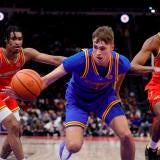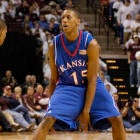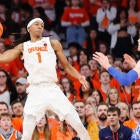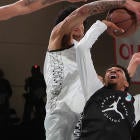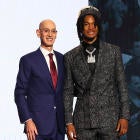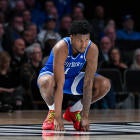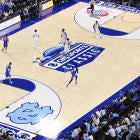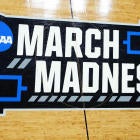The 2012-13 Louisville Cardinals were my favorite college basketball team of all time.
I know that sounds weird. I'm not from Kentucky. I didn't attend Louisville. I wasn't related to any players on the team. But there was something special about that team that I hadn't experienced before and haven't experienced since.
Like so many of the best things in life – the best book you've ever read, or the best meal you've ever had, or the best concert you've ever attended, or the best sports team you've ever watched – part of it has to do with you, and where you were at in life when you experienced it. The 2012-13 season was the first season I spent covering college basketball, having transitioned from a general assignment national sportswriter to a college hoops specialist that fall.
And I fell in love with the dynamics of that Louisville team from the tip. I loved hearing Peyton Siva's rags-to-riches story early in the season, how when he was growing up in Seattle, he saved his father from suicide and drug addiction. I was astounded when I walked into Rick Pitino's palatial office for an audience with an all-time great basketball coach. I dove into learning how a pressing and trapping defense like Louisville's could dominate other teams into submission. I don't think I've ever seen a college basketball team as tightly knitted together on defense as that Louisville team. The numbers bear that out as only two teams in the past 15 years have had a better defensive efficiency rating than that Louisville team. Ironically, those two teams were both coached by Pitino's cross-state rival, John Calipari.
I was amazed at the athleticism of freshman Montrezl Harrell, I was compelled by the maturity and life journey of Senegalese big man Gorgui Dieng, and I was right when I predicted both of those players would have NBA futures. I was touched by the story of Luke Hancock, the young man who improbably won most outstanding player of the 2013 NCAA tournament with his ailing father in the stands; his father would die of cancer less than three months after his son cut down the nets.
Are those the only reasons I fell in love with this team? Absolutely not. I remember watching in a smelly hotel room in South Carolina when Louisville played one of the most emotionally exhausting college games I'd ever seen, a five-overtime February loss at Notre Dame that just made you shake your head in its absurdity.
After that five-overtime loss, Louisville wouldn't lose another game.
I was in Madison Square Garden during the Big East Tournament when Russ Smith went off for 28 points just hours after learning his high school coach and mentor passed away. And I was there a couple nights later when Louisville was down 16 points in the second half to Syracuse in the Big East Tournament championship game – in the final year of the "old Big East" – then harassed Syracuse into 20 turnovers with that frenetic Pitino-patented full-court press to win the tournament. Bill Clinton paid a visit to their locker room.
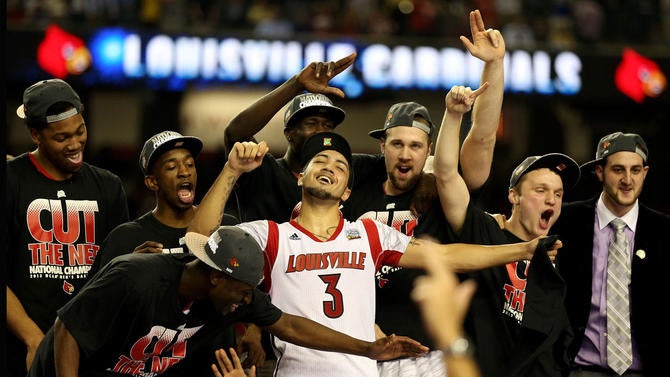
A couple weeks later I had just flown back from watching Syracuse clinch a Final Four berth and was sitting on my couch, my newborn son on my lap, when Kevin Ware gruesomely broke his leg in the Elite Eight against Duke. That moment became this team's inspiration for a national title.
I was courtside in the Final Four game against Wichita State, which serendipitously happened to be a team I had spent several days embedded with in the middle of the regular season. I was amazed when this mid-major team took Louisville to the limit with Louisville needing a couple of timely 3-pointers from bench player Tim Henderson (who?) to stay in the game.
I remember that remarkable back-and-forth title game against Michigan. Michigan's player of the year candidate Trey Burke got into foul trouble, and then reserve Spike Albrecht (who?) made four 3-pointers to give Michigan the halftime lead. I remember Dieng running back in transition, losing his balance and nearly falling into my lap; Yahoo writer Pat Forde and I pushed him back onto the raised court, and the game continued. I remember Siva's father seated directly behind us; the entire game, the born-again Christian kept yelling, "It's just Jesus!"
And I remembered standing in the delirious Louisville locker room after "One Shining Moment" had played that night. Backup big man Stephan Van Treese, who'd played three minutes, farted, and Henderson made fun of him. Siva spoke about the grace of God in his life. Players cried. Coaches did too.
So I ask myself this, on a day when the NCAA denied Louisville's appeal and permanently took away that national title – plus 122 other wins, every single game it won between the 2011-12 season and the 2014-15, seasons when the school retroactively was deemed to have played ineligible players because of a sordid sex scandal:
Did all of that actually happen?
The idea of the NCAA vacating wins is at once silly and profound. You cannot take away what happened on April 8, 2013 at the Georgia Dome in Atlanta. Louisville still beat Michigan that night, 82-76, and was the last team standing after that college basketball season. Shortly after the NCAA announced it had rejected Louisville's appeal on Tuesday, Ware tweeted this out: "Still got this fat ass ring which means my guys definitely won a chip, if I'm not mistaken of course."
Yes, it all happened.
And at the same time, it's all erased.
Michigan is not the 2013 national champion. NCAA record books will list nobody as the champion. It's silly, taking an eraser to history, and yet at the same time it's one of the most profound punishments the NCAA can hand down. I earnestly believe that even though it's silly to erase history, there's nothing the NCAA could do that would hurt Pitino more than this.
Never again will you think of that Final Four without thinking about it as the only vacated national championship in NCAA Division I men's basketball history. Never again will I think of my first season covering this wonderful sport without being reminded of this sport's sordid underbelly. As toothless as taking away a banner is in practice, it's powerful to the psyche. To Louisville fans, and coaches, and students who celebrated in the street that night, and most of all, to players who experienced the height of this sport's success: What happened on that Monday night five years ago is now forever tainted.
It's not so different than baseball's steroid scandal. The home-run chase of 1998 was remarkable, and brought baseball back from its increasing irrelevance, but you can't think of Mark McGwire and Sammy Sosa without being reminded that they cheated. Lance Armstrong's incredible run of Tour de France victories still happened, but they don't live on the same in our memory because we know he cheated. Marion Jones, Ben Johnson, the Black Sox: I don't know where history will place this Louisville team's vacated title in the pantheon of all-time athletic disgraces, but it will certainly be in the conversation.
They were the most inspirational team I've ever covered.
And, as it turns out, they were also the team that broke my heart.








